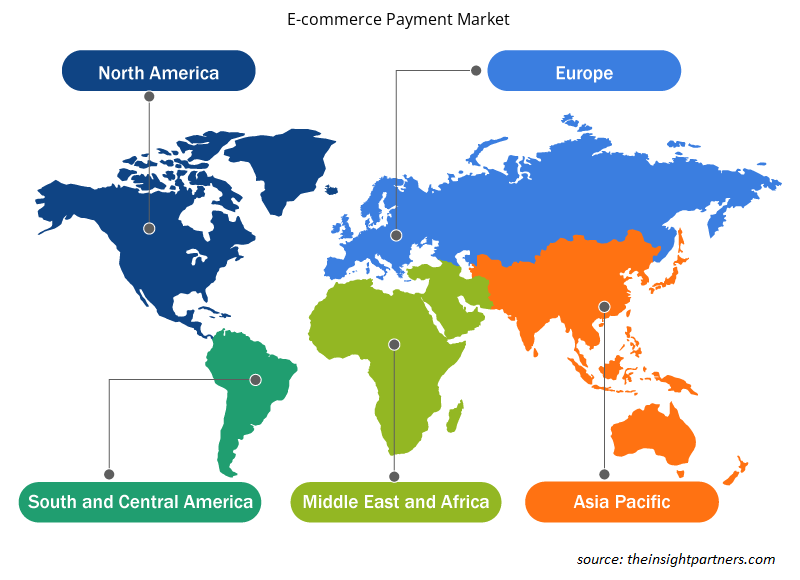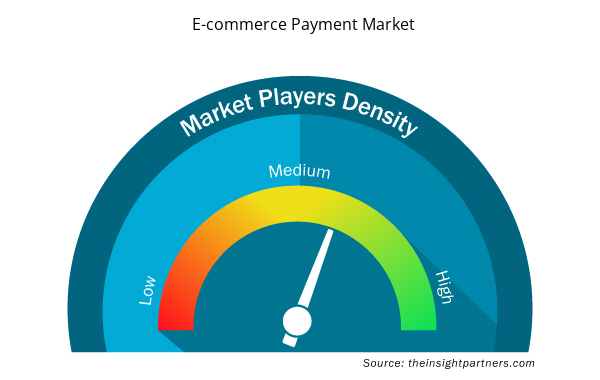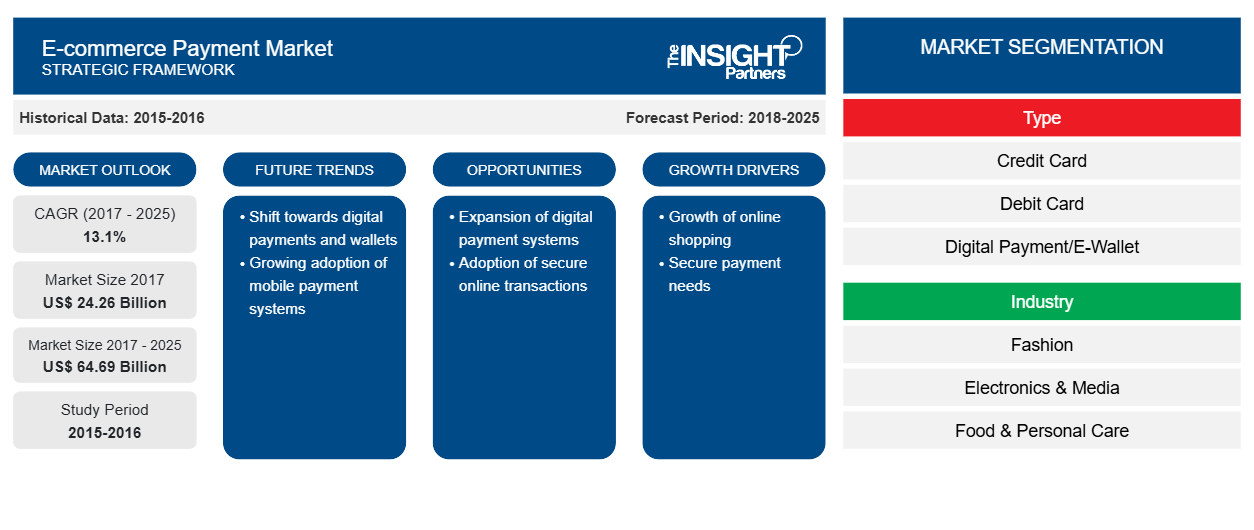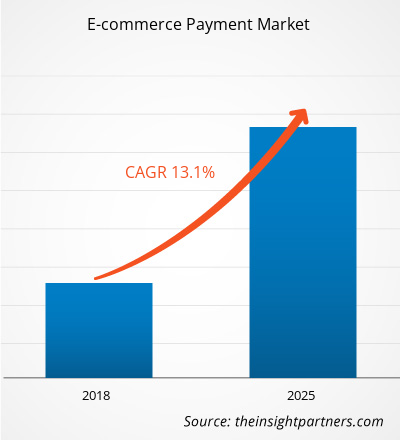Si prevede che il mercato globale dei pagamenti e-commerce crescerà da 24,26 miliardi di dollari nel 2017 a 64,69 miliardi di dollari entro il 2025, con un CAGR del 13,1% tra il 2018 e il 2025.
Il mercato dei pagamenti e-commerce sta vivendo una crescita in tutto il mondo, con la crescente preferenza per i pagamenti online dovuta alla disponibilità di diversi metodi di pagamento. Inoltre, la crescente adozione di smartphone e la disponibilità di Internet stanno anche spingendo la crescita del mercato dei pagamenti e-commerce. Inoltre, il crescente numero di popolazione bancaria e la digitalizzazione, si prevede che il mercato dei pagamenti e-commerce prospererà durante il periodo di previsione. Il rapporto si concentra su una segmentazione approfondita del mercato dei pagamenti e-commerce in base a tipo, settore verticale e area geografica.
Approfondimenti di mercato
L'APAC è riconosciuta come la regione leader durante tutto il periodo di previsione
La regione Asia-Pacifico comprende diversi paesi in via di sviluppo come Corea del Sud, India, Indonesia e Malesia, tra gli altri. Questi paesi stanno assistendo a una forte crescita della loro popolazione, con conseguente crescita del mercato dei pagamenti e-commerce. Il settore dell'e-commerce della regione sta fiorendo con la crescente penetrazione di Internet e l'elevata adozione di smartphone e tablet. Inoltre, i governi delle economie emergenti stanno prendendo iniziative per migliorare la popolazione bancaria, fornendo così una piattaforma migliore al settore dei pagamenti online. Di recente, è stato notato un cambiamento in cui i consumatori in tutta l'APAC preferiscono pagare online tramite metodi di pagamento alternativi come portafogli elettronici, bonifici bancari e carte di credito e di debito. Si prevede che il crescente utilizzo di questi metodi di pagamento contribuirà in modo significativo alla crescita dei gateway di pagamento nel settore dell'e-commerce durante il periodo di previsione. Si prevede che questi fattori stimoleranno ulteriormente la domanda di mercato dei pagamenti e-commerce nella regione APAC.
Personalizza questo report in base alle tue esigenze
Riceverai la personalizzazione gratuita di qualsiasi report, comprese parti di questo report, o analisi a livello nazionale, pacchetto dati Excel, oltre a usufruire di grandi offerte e sconti per start-up e università
- Scopri le principali tendenze di mercato in questo rapporto.Questo campione GRATUITO includerà analisi di dati che spaziano dalle tendenze di mercato alle stime e alle previsioni.
Il modello di business nel commercio al dettaglio rimane inutilizzato nella regione del Medio Oriente, offrendo così un enorme potenziale per gli operatori del settore
I pagamenti digitali in Medio Oriente sono a un punto di rottura poiché normative, cultura e tecnologia sono testimoni di cambiamenti di paradigma, aprendo la porta alle aziende innovative per sconvolgere i più vecchi ecosistemi di pagamento. Oltre l'80% dei pagamenti al dettaglio fisici e il 65% dei pagamenti e-commerce vengono ancora effettuati in contanti e l'adozione degli smartphone supera il 100% in diversi paesi. La penetrazione mobile nella regione MEA è sull'orlo di una nuova era guidata dall'evoluzione del comportamento dei consumatori, dalla rapida industrializzazione, dalle ambizioni del governo e dalle mutevoli condizioni economiche. Le opportunità sono state identificate nella crescita dell'accesso ai dati e dei ricavi, che stanno diventando sostanziali e in forte crescita; e anche nei servizi di pagamento digitale. Ciò è convalidato dal fatto che la penetrazione degli smartphone nella regione è superiore al 65%. Inoltre, oltre due terzi della popolazione utilizza Internet, con una penetrazione negli Emirati Arabi Uniti e in Qatar che supera il 90%. La regione ha una popolazione sostanziale di individui benestanti con un appetito per i beni di lusso.
L'iniziativa di mercato è stata osservata come la strategia più adottata nel mercato globale dei pagamenti per l'e-commerce. Di seguito sono elencate alcune delle strategie recenti di alcuni dei player nel panorama del mercato dei pagamenti per l'e-commerce:
2018: PayPal ha annunciato l'estensione del suo accordo di partnership con eBay. Attraverso questo accordo eBay continua a promuovere e accettare PayPal Credit tramite la piattaforma di marketplace.
2018: Alipay ha annunciato il lancio in 20 paesi europei alla fine di quest'anno. La società ha firmato contratti con oltre 40 società di portafogli digitali e 100 banche in tutta Europa.
2018: Visa, Inc. ha annunciato l'estensione della sua partnership con PayPal al Canada, per accelerare l'implementazione di pagamenti mobili e digitali affidabili, sicuri e appropriati per commercianti e consumatori.
Approfondimenti regionali sul mercato dei pagamenti per l'e-commerce
Le tendenze regionali e i fattori che influenzano il mercato dei pagamenti per l'e-commerce durante il periodo di previsione sono stati ampiamente spiegati dagli analisti di Insight Partners. Questa sezione discute anche i segmenti e la geografia del mercato dei pagamenti per l'e-commerce in Nord America, Europa, Asia Pacifico, Medio Oriente e Africa e America meridionale e centrale.

- Ottieni i dati specifici regionali per il mercato dei pagamenti e-commerce
Ambito del rapporto sul mercato dei pagamenti per l'e-commerce
| Attributo del report | Dettagli |
|---|---|
| Dimensioni del mercato nel 2017 | 24,26 miliardi di dollari USA |
| Dimensioni del mercato entro il 2025 | 64,69 miliardi di dollari USA |
| CAGR globale (2017-2025) | 13,1% |
| Dati storici | 2015-2016 |
| Periodo di previsione | 2018-2025 |
| Segmenti coperti | Per tipo
|
| Regioni e Paesi coperti | America del Nord
|
| Leader di mercato e profili aziendali chiave |
|
Densità degli attori del mercato: comprendere il suo impatto sulle dinamiche aziendali
Il mercato dei pagamenti per l'e-commerce sta crescendo rapidamente, spinto dalla crescente domanda degli utenti finali dovuta a fattori quali l'evoluzione delle preferenze dei consumatori, i progressi tecnologici e una maggiore consapevolezza dei vantaggi del prodotto. Con l'aumento della domanda, le aziende stanno ampliando le loro offerte, innovando per soddisfare le esigenze dei consumatori e capitalizzando sulle tendenze emergenti, il che alimenta ulteriormente la crescita del mercato.
La densità degli operatori di mercato si riferisce alla distribuzione di aziende o società che operano in un particolare mercato o settore. Indica quanti concorrenti (operatori di mercato) sono presenti in un dato spazio di mercato in relazione alle sue dimensioni o al valore di mercato totale.
Le principali aziende che operano nel mercato dei pagamenti per l'e-commerce sono:
- PayPal Holdings, Inc.
- Pagamenti Amazon, Inc.
- Società a responsabilità limitata
- Pagamento con carta di credito
- Pagamento tramite Alipay
Disclaimer : le aziende elencate sopra non sono classificate secondo un ordine particolare.

- Ottieni una panoramica dei principali attori del mercato dei pagamenti per l'e-commerce
Segmentazione del mercato globale dei pagamenti per l'e-commerce
Per tipo
- Carta di credito
- Carta di debito
- Pagamento digitale/Portafoglio elettronico
- Servizi bancari online
- Buoni regalo
- Altri
Per settore
- Moda
- Elettronica e media
- Cibo e cura della persona
- Mobili ed elettrodomestici
- Settore dei servizi
- Altri
Per Geografia
America del Nord
- NOI
- Canada
- Messico
Europa
- Francia
- Germania
- Italia
- Spagna
- Regno Unito
- Resto d'Europa
Asia Pacifico (APAC)
- Australia
- Cina
- India
- Giappone
- Resto dell'APAC
Medio Oriente e Africa (MEA)
- Arabia Saudita
- Emirati Arabi Uniti
- Sudafrica
- Resto del MEA
America del Sud (SAM)
- Brasile
- Resto del SAM
Profili aziendali
- PayPal Holdings, Inc.
- Pagamenti Amazon, Inc.
- Società a responsabilità limitata
- Pagamento con carta di credito
- Pagamento tramite Alipay
- Visa, Inc.
- MasterCard Incorporata
- Società a responsabilità limitata
- Società American Express
- Società anonima UnionPay International Co., Ltd.
- Analisi storica (2 anni), anno base, previsione (7 anni) con CAGR
- Analisi PEST e SWOT
- Valore/volume delle dimensioni del mercato - Globale, regionale, nazionale
- Industria e panorama competitivo
- Set di dati Excel


- Water Pipeline Leak Detection System Market
- Cling Films Market
- Hydrogen Storage Alloys Market
- Visualization and 3D Rendering Software Market
- Online Exam Proctoring Market
- Nuclear Decommissioning Services Market
- Lymphedema Treatment Market
- Artificial Intelligence in Defense Market
- Medical Devices Market
- Dairy Flavors Market

Report Coverage
Revenue forecast, Company Analysis, Industry landscape, Growth factors, and Trends

Segment Covered
This text is related
to segments covered.

Regional Scope
North America, Europe, Asia Pacific, Middle East & Africa, South & Central America

Country Scope
This text is related
to country scope.
Trends and growth analysis reports related to Banking, Financial Services, and Insurance : READ MORE..
The List of Companies
1. PayPal Holdings, Inc.
2. Amazon Payments, Inc.
3. CCBill, LLC
4. WePay Inc.
5. Alipay
6. Visa, Inc.
7. MasterCard Incorporated
8. Stripe Inc.
9. American Express Company
10. UnionPay International Co., Ltd.
The Insight Partners performs research in 4 major stages: Data Collection & Secondary Research, Primary Research, Data Analysis and Data Triangulation & Final Review.
- Data Collection and Secondary Research:
As a market research and consulting firm operating from a decade, we have published and advised several client across the globe. First step for any study will start with an assessment of currently available data and insights from existing reports. Further, historical and current market information is collected from Investor Presentations, Annual Reports, SEC Filings, etc., and other information related to company’s performance and market positioning are gathered from Paid Databases (Factiva, Hoovers, and Reuters) and various other publications available in public domain.
Several associations trade associates, technical forums, institutes, societies and organization are accessed to gain technical as well as market related insights through their publications such as research papers, blogs and press releases related to the studies are referred to get cues about the market. Further, white papers, journals, magazines, and other news articles published in last 3 years are scrutinized and analyzed to understand the current market trends.
- Primary Research:
The primarily interview analysis comprise of data obtained from industry participants interview and answers to survey questions gathered by in-house primary team.
For primary research, interviews are conducted with industry experts/CEOs/Marketing Managers/VPs/Subject Matter Experts from both demand and supply side to get a 360-degree view of the market. The primary team conducts several interviews based on the complexity of the markets to understand the various market trends and dynamics which makes research more credible and precise.
A typical research interview fulfils the following functions:
- Provides first-hand information on the market size, market trends, growth trends, competitive landscape, and outlook
- Validates and strengthens in-house secondary research findings
- Develops the analysis team’s expertise and market understanding
Primary research involves email interactions and telephone interviews for each market, category, segment, and sub-segment across geographies. The participants who typically take part in such a process include, but are not limited to:
- Industry participants: VPs, business development managers, market intelligence managers and national sales managers
- Outside experts: Valuation experts, research analysts and key opinion leaders specializing in the electronics and semiconductor industry.
Below is the breakup of our primary respondents by company, designation, and region:

Once we receive the confirmation from primary research sources or primary respondents, we finalize the base year market estimation and forecast the data as per the macroeconomic and microeconomic factors assessed during data collection.
- Data Analysis:
Once data is validated through both secondary as well as primary respondents, we finalize the market estimations by hypothesis formulation and factor analysis at regional and country level.
- Macro-Economic Factor Analysis:
We analyse macroeconomic indicators such the gross domestic product (GDP), increase in the demand for goods and services across industries, technological advancement, regional economic growth, governmental policies, the influence of COVID-19, PEST analysis, and other aspects. This analysis aids in setting benchmarks for various nations/regions and approximating market splits. Additionally, the general trend of the aforementioned components aid in determining the market's development possibilities.
- Country Level Data:
Various factors that are especially aligned to the country are taken into account to determine the market size for a certain area and country, including the presence of vendors, such as headquarters and offices, the country's GDP, demand patterns, and industry growth. To comprehend the market dynamics for the nation, a number of growth variables, inhibitors, application areas, and current market trends are researched. The aforementioned elements aid in determining the country's overall market's growth potential.
- Company Profile:
The “Table of Contents” is formulated by listing and analyzing more than 25 - 30 companies operating in the market ecosystem across geographies. However, we profile only 10 companies as a standard practice in our syndicate reports. These 10 companies comprise leading, emerging, and regional players. Nonetheless, our analysis is not restricted to the 10 listed companies, we also analyze other companies present in the market to develop a holistic view and understand the prevailing trends. The “Company Profiles” section in the report covers key facts, business description, products & services, financial information, SWOT analysis, and key developments. The financial information presented is extracted from the annual reports and official documents of the publicly listed companies. Upon collecting the information for the sections of respective companies, we verify them via various primary sources and then compile the data in respective company profiles. The company level information helps us in deriving the base number as well as in forecasting the market size.
- Developing Base Number:
Aggregation of sales statistics (2020-2022) and macro-economic factor, and other secondary and primary research insights are utilized to arrive at base number and related market shares for 2022. The data gaps are identified in this step and relevant market data is analyzed, collected from paid primary interviews or databases. On finalizing the base year market size, forecasts are developed on the basis of macro-economic, industry and market growth factors and company level analysis.
- Data Triangulation and Final Review:
The market findings and base year market size calculations are validated from supply as well as demand side. Demand side validations are based on macro-economic factor analysis and benchmarks for respective regions and countries. In case of supply side validations, revenues of major companies are estimated (in case not available) based on industry benchmark, approximate number of employees, product portfolio, and primary interviews revenues are gathered. Further revenue from target product/service segment is assessed to avoid overshooting of market statistics. In case of heavy deviations between supply and demand side values, all thes steps are repeated to achieve synchronization.
We follow an iterative model, wherein we share our research findings with Subject Matter Experts (SME’s) and Key Opinion Leaders (KOLs) until consensus view of the market is not formulated – this model negates any drastic deviation in the opinions of experts. Only validated and universally acceptable research findings are quoted in our reports.
We have important check points that we use to validate our research findings – which we call – data triangulation, where we validate the information, we generate from secondary sources with primary interviews and then we re-validate with our internal data bases and Subject matter experts. This comprehensive model enables us to deliver high quality, reliable data in shortest possible time.


 Ottieni un campione gratuito per questo repot
Ottieni un campione gratuito per questo repot